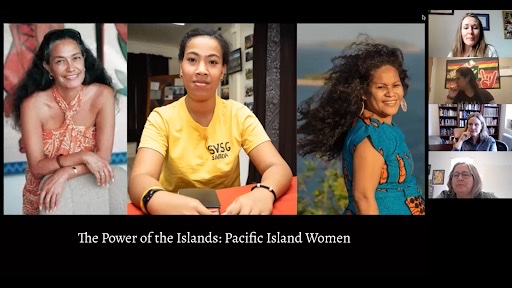
By: Chloe Gamber, Head Academics Writer
Kealoha Charles, a Sociology major at McKendree from Hawaii, is the presenter of this week’s Brown Bag. She first discusses the three regions in the pacific. Kaeloha starts by explaining the regions they are from – one is from Papua New Guinea in Melanesia, which was occupied by Australia during World War I. Polynesia Samoa has a neighbor called American Samoa that is occupied by the U.S. along with Hawaii, which has been occupied by the U.S. since the 1800s being in the same region. “The importance of this is to show that these women are all from the pacific, but from very different regions and each place has its own occupation which has changed its society and culture.”
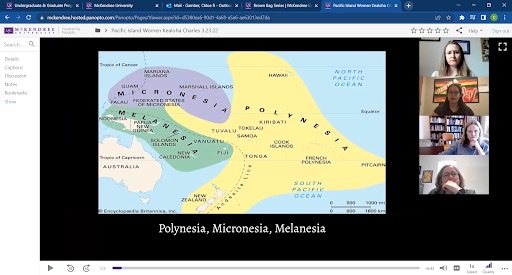
Vavine Nadesalingam from Papua New Guinea is an entrepreneur. In 2016, she was the first woman from her country to rep her country in the global entry submit in Beijing. This involved networking across the world. In 2018, as an alumna she won the enter of the year award for Southern Cross University’s Annual Alumni of the Year awards. Not only has she accomplished this, but she has also founded the organization Voices for Village Foundation. This organization “Addresses all of the issues in rural Papua New Guinea, such as education, water, sanitation.” Operating a network for local schools in the area is an additional way she contributes to society. Within this presentation, a video via the link provided in the image shows how impactful Vavine has been through the challenges the village faces. They use WiFi and solar power for the rural community to also help them through Kacific solutions.
With these needs, Kaeloha expresses that Vavine’s idealistic approach involved creating an environment for the people of Papua New Guinea to be entrepreneurs and leaders. Her thoughts can be expressed through this quote: “It’s an honor to raise awareness about the challenges that women face in Papua New Guinea and how we need a level playing field to encourage more women in leadership. I want to share my story to inspire other young people who are facing challenges to tell them they can always find a way to have a positive impact in their community as well.” Vavine. Kaeloha emphasizes how Vavine truly shows the struggles of getting an education in communities such as Papua New Guinea.
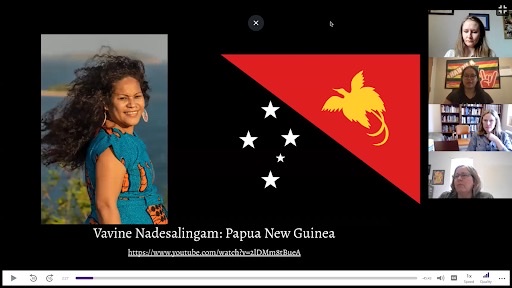
The next powerful woman discussed is Leilua. Her story involves her story of harsh conditions as a child which led her to helping guide those in Polynesia. Present day, she is an ambassador for the CSG and this allows her to pass her message and educate awareness. In 2019, she was “The first recipient of the Commonwealth Innovation for Sustainable Development Award, which is an award for peace.” This accomplishment goes beyond amazement because she is the first person to receive such a title. A statement by Leilua we all should reflect on is that “There is always someone out there that can give a helping hand.”To look deeper into her story the link provided is her testimony for the issues she has faced.
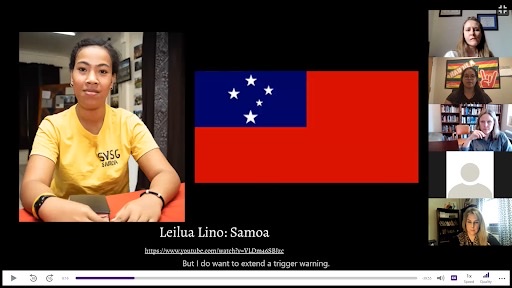
The last voice in this presentation, Dr. Haunani-Kay was described by Kaeloha as a woman who was alive during the occupation of Hawaii. She was born ten years prior to Hawaii becoming a state in 1959. She was only ten years old when Hawaii was transitioning into a state where she saw how this affected those around her. A couple years later, she became an activist for the Hawaiian people along with being a leader in the Hawaiian sovereignty movement which is still occurring today. Also as a member of the organization Kalahari Hawaii, they promote self determination and leadership to help Hawaiians get to the roots of their culture. In July of 2021, she passed away but prior to this she was discussed through various ways while Kaeloha was a child. Some of her famous speeches can be watched in the links provided next to her picture.
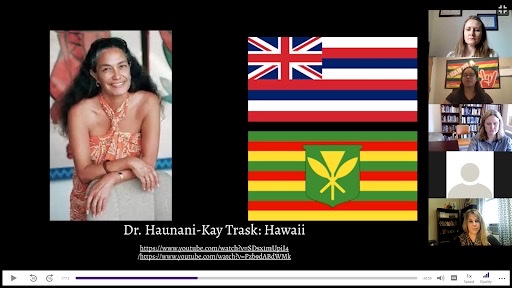
Regardless of the messages each of these women are presenting, they all had achievements that not many can accomplish. Dedication and persistence are essential to gaining success through any cause you stand for. A valuable question was asked after Kaeloha presented – resources such as spreading internet usage were discussed in the presentation, so the question of “What other kind of resources and tools are beneficial to helping them?” was raised, meaning women and those raising awareness.
Kealoha responded “Well, I think in this day and age, I feel like the best way to give them a voice or give them some sort of platform is social media.” The next main point discussed in the question portion of the presentation involves the culture and traditions of Hawaii. Kealoha explains how she feels that a lot of Hawaiian culture has not been addressed even in her own public education. Her culture was strictly learned through the influences of her family and while meeting with other students at McKendree, she did not hear any information taught about Hawaii and its history. This is very crucial to the development of the world as a whole and its history.
In the history of Hawaii, Kola also answers why she feels women should be more empowered in Hawaii. In Hawaiian culture, Kaeloha emphasizes how the queens along with the kings and Chiefs were all very influential and she says “Hawaiian women, I believe, are the backbone of Hawaiian culture.” This week’s Brown Bag can teach many different lessons on the history and culture of the Pacific Islands and their strong leaders.